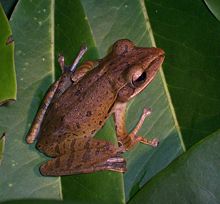Common tree frog
| Common tree frog | |
|---|---|

| |
| Common tree frog (female) | |

| |
| Adult at Darmaga (Bogor Regency, West Java, Indonesia) | |
| Scientific classification | |
| Kingdom: | |
| Phylum: | |
| Class: | |
| Order: | |
| Family: | |
| Genus: | |
| Species: | P. leucomystax
|
| Binomial name | |
| Polypedates leucomystax (Gravenhorst, 1829)
| |
| Synonyms | |
| |
Polypedates leucomystax is a species in the shrub frog family Rhacophoridae. It is known under numerous common names, including common tree frog, four-lined tree frog, golden tree frog[2] or striped tree frog. Many past authors have united it with the common Indian tree frog in P. maculatus (or Rhacophorus maculatus, as was common in older times), but today they are generally considered distinct species. In its native range, it is also called "white-lipped tree frog", but this name is otherwise applied to a species of true tree frogs (family Hylidae).
It is found in Bangladesh, Brunei, Cambodia, China, India, Indonesia, Laos, Malaysia, Myanmar, Nepal, the Philippines, Singapore, Thailand, Vietnam, and possibly Bhutan. It has been introduced to Japan.
Its natural habitats are subtropical or tropical dry forests, subtropical or tropical moist lowland forests, subtropical or tropical moist montane forests, subtropical or tropical moist shrubland, subtropical or tropical seasonally wet or flooded lowland grassland, rivers, intermittent rivers, freshwater lakes, intermittent freshwater lakes, freshwater marshes, intermittent freshwater marshes, freshwater springs, rocky shores, coastal freshwater lagoons, arable land, pastureland, plantations, rural gardens, urban areas, water storage areas, ponds, aquaculture ponds, irrigated land, seasonally flooded agricultural land, and introduced vegetation.
It is not considered a threatened species by the IUCN.[1]
In captivity
This species of tree frog is commonly kept in captivity in vivariums and terrariums by both hobbyists and professional.[2]
References
- ^ a b Diesmos, A., et al. (2004). Polypedates leucomystax. In: IUCN 2013. IUCN Red List of Threatened Species. Version 2013.2. www.iucnredlist.org Archived 2014-06-27 at the Wayback Machine. Downloaded on 01 December 2013.
- ^ a b "Golden Tree Frog (Polypedates leucomystax)". amphibiancare. October 31, 2009. Retrieved July 24, 2016.
External links
![]() Media related to Polypedates leucomystax at Wikimedia Commons
Media related to Polypedates leucomystax at Wikimedia Commons

